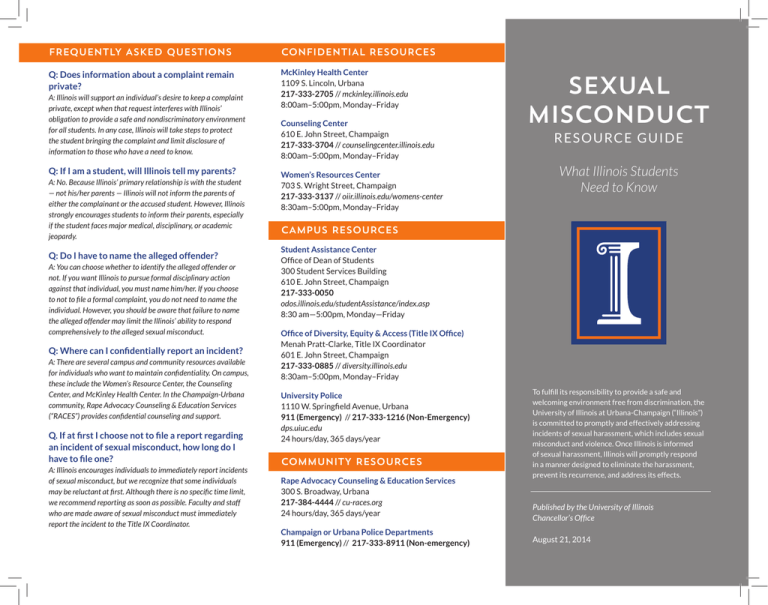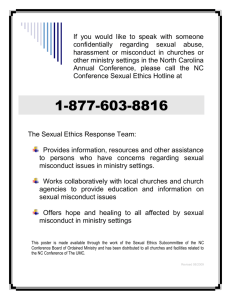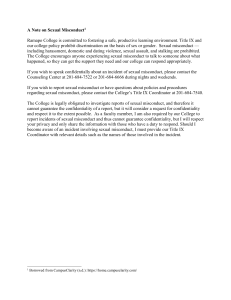
FREQUENTLY ASKED QUESTIONS
CONFIDENTIAL RESOURCES
Q: Does information about a complaint remain
private?
McKinley Health Center
1109 S. Lincoln, Urbana
217-333-2705 // mckinley.illinois.edu
8:00am–5:00pm, Monday–Friday
A: Illinois will support an individual’s desire to keep a complaint
private, except when that request interferes with Illinois’
obligation to provide a safe and nondiscriminatory environment
for all students. In any case, Illinois will take steps to protect
the student bringing the complaint and limit disclosure of
information to those who have a need to know.
Q: If I am a student, will Illinois tell my parents?
A: No. Because Illinois’ primary relationship is with the student
— not his/her parents — Illinois will not inform the parents of
either the complainant or the accused student. However, Illinois
strongly encourages students to inform their parents, especially
if the student faces major medical, disciplinary, or academic
jeopardy.
Q: Do I have to name the alleged offender?
A: You can choose whether to identify the alleged offender or
not. If you want Illinois to pursue formal disciplinary action
against that individual, you must name him/her. If you choose
to not to file a formal complaint, you do not need to name the
individual. However, you should be aware that failure to name
the alleged offender may limit the Illinois’ ability to respond
comprehensively to the alleged sexual misconduct.
Q: Where can I confidentially report an incident?
A: There are several campus and community resources available
for individuals who want to maintain confidentiality. On campus,
these include the Women’s Resource Center, the Counseling
Center, and McKinley Health Center. In the Champaign-Urbana
community, Rape Advocacy Counseling & Education Services
(“RACES”) provides confidential counseling and support.
Q. If at first I choose not to file a report regarding
an incident of sexual misconduct, how long do I
have to file one?
A: Illinois encourages individuals to immediately report incidents
of sexual misconduct, but we recognize that some individuals
may be reluctant at first. Although there is no specific time limit,
we recommend reporting as soon as possible. Faculty and staff
who are made aware of sexual misconduct must immediately
report the incident to the Title IX Coordinator.
Counseling Center
610 E. John Street, Champaign
217-333-3704 // counselingcenter.illinois.edu
8:00am–5:00pm, Monday–Friday
Women’s Resources Center
703 S. Wright Street, Champaign
217-333-3137 // oiir.illinois.edu/womens-center
8:30am–5:00pm, Monday–Friday
SEXUAL
MISCONDUCT
RES OURCE GUIDE
What Illinois Students
Need to Know
CAMPUS RESOURCES
Student Assistance Center
Office of Dean of Students
300 Student Services Building
610 E. John Street, Champaign
217-333-0050
odos.illinois.edu/studentAssistance/index.asp
8:30 am—5:00pm, Monday—Friday
Office of Diversity, Equity & Access (Title IX Office)
Menah Pratt-Clarke, Title IX Coordinator
601 E. John Street, Champaign
217-333-0885 // diversity.illinois.edu
8:30am–5:00pm, Monday–Friday
University Police
1110 W. Springfield Avenue, Urbana
911 (Emergency) // 217-333-1216 (Non-Emergency)
dps.uiuc.edu
24 hours/day, 365 days/year
COMMUNITY RESOURCES
Rape Advocacy Counseling & Education Services
300 S. Broadway, Urbana
217-384-4444 // cu-races.org
24 hours/day, 365 days/year
Champaign or Urbana Police Departments
911 (Emergency) // 217-333-8911 (Non-emergency)
To fulfill its responsibility to provide a safe and
welcoming environment free from discrimination, the
University of Illinois at Urbana-Champaign (“Illinois”)
is committed to promptly and effectively addressing
incidents of sexual harassment, which includes sexual
misconduct and violence. Once Illinois is informed
of sexual harassment, Illinois will promptly respond
in a manner designed to eliminate the harassment,
prevent its recurrence, and address its effects.
Published by the University of Illinois
Chancellor’s Office
August 21, 2014
IF YOU OR A FRIEND HAVE
EXPERIENCED SEXUAL
MISCONDUCT
WHAT IS SEXUAL
MISCONDUCT?
The Student Code broadly defines “sexual
misconduct” as “any sexual activity that does not
involve the knowing consent of each individual.”
Section 1-302(b). Examples of sexual misconduct
include, but are not limited to:
•
•
Any form of sexual penetration without
consent;
Intentional fondling without consent of sex
organs, buttocks, or breasts for the purpose of
sexual gratification;
•
Indecent exposure with sexual intent;
•
Sending sexually explicit or intimidating
emails, texts, or other communications that are
unwelcome to the recipient;
•
Sexual harassment;
•
Recording, transmitting, or allowing third
parties to view, sexual acts involving one or
more others without their knowledge and
consent;
•
Stalking, sexual violence, domestic violence,
and dating violence.
Under this Student Code, consent must be
informed, freely and actively given through
mutually understandable words or actions that
demonstrate willingness to participate in mutually
agreed upon sexual activity. Consent resulting
from force, threats, intimidation, coercion, or from
someone who is incapable of making a rational,
reasonable decision is not effective.
If you are concerned about safety or need medical
attention, call 911 or go to a local medical facility:
•
•
•
McKinley Health Center, 1109 S. Lincoln Ave., Urbana
Carle Foundation Hospital, 611 W. Park St., Urbana
Presence Covenant Medical Center, 1400 W. Park St.,
Urbana
If there are no safety risks or serious injuries, go to a safe place
and contact a friend or family member you trust to stay with you.
Steps to Consider
Preserving Evidence
It is important to preserve physical evidence of an assault
even if you do not yet know whether you want to report the
assault or pursue filing a complaint. Evidence is best collected
as soon as possible or at least within 96 hours of the incident.
Do not shower to avoid washing away evidence. You can
also preserve evidence by saving text messages, instant
messages, and other communications that may be useful to
investigators.
Seeking Medical Attention As Soon As Possible
If you go to a medical facility, the trained professionals can
collect necessary physical evidence. Even if you do not opt
for forensic evidence collection, health care professionals
can treat injuries and take steps to address concerns of
pregnancy and/or sexually transmitted disease.
Reporting the Sexual Misconduct
Although Illinois strongly encourages all members of the
community to immediately report sexual misconduct to
law enforcement, you have a choice whether to make such
a report, and you can decline to involve the police. Refer to
the Options for Reporting Sexual Misconduct section of this
brochure for more information.
Seeking Other Assistance and Support
You may want to seek confidential counseling from the
organizations listed in the Resources section of this brochure.
For immediate assistance with academic matters, contact the
Student Assistance Center in the Office of the Dean of
Students at 217-333-0050 or HELPdean@illinois.edu.
OPTIONS FOR
REPORTING
SEXUAL MISCONDUCT
Illinois strongly encourages prompt reporting
of sexual misconduct. You have several options.
You can:
• Seek confidential assistance by contacting the
confidential resources listed in the Resources
section of this brochure.
•
Report the incident to the Title IX Office.
•
File a criminal report with the University of
Illinois Police Department, Champaign Police
Department, or Urbana Police Department.
•
Pursue student discipline by contacting
the Office for Student Conflict Resolution
(“OSCR”) at 217-333-3680. For a description
of the procedures in the student discipline
process, please refer to
conflictresolution.illinois.edu/student discipline
Reports may be made by:
• An individual who has experienced sexual
misconduct;
•
Anyone who receives a report from someone
who experienced sexual misconduct; and/or
•
Anyone who witnesses or otherwise has
information that sexual misconduct may have
occurred.
In most instances, the individual or department
receiving the initial information will complete a
report and provide a copy to the Title IX Office for
follow up. Faculty and staff who are made aware
of sexual misconduct must immediately report the
incident to the Title IX Office.



